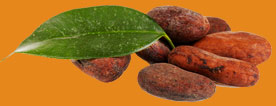Using extracts of coca leaf will require that people daily consume micrograms of water-insoluble coca alkaloid, if they want to daily consume multi-grams of sugar-free, mostly fat-free chocolate. Will this be safe for consumers? YES!

LD50 (Lethal Dose 50 - how much of something you can give to rats before half of them die) is a standard measure of the safety of a food additive. In 1982, pharmacists at the Univ. of Mississippi measured the LD50 for coca tea (the dehydrated form used in KukaXoco chocolate) - "Comparative lethality of coca [leaf] and cocaine". The pharmacists determined that coca tea is safer than most other chemicals injected into your foods, as shown in the following table. If you are comfortable putting salt and vanilla in the foods you eat, you will be more comfortable using micrograms of coca alkaloid. Items highlighted below are current additives in chocolate.
Food Additive LD50 (mg/kg) Toxicity Can be Used in Chocolate Inulin > 5000 Most Safe Yes Cinnamon < 4500 Yes COCA LEAF EXTRACTS 3450 Yes Table Salt 3000 Yes Citric Acid 3000 Vanilla < 3000 Yes Parabens / PHB esters < 3000 Menthol 2900 BHT (butylated hydroxytoluene) < 2900 Polyglycerol Polyricinoleate > 2600 Yes Disodium EDTA ~ 2500 Vitamin A (all-trans-Retinol) 2000 Propyl Gallate 2100 Alicyclic Ketones < 2000 2,3,5,6 - Tetramethylpyrazine 1910 Yes Potassium Carbonate
(used in Dutch process)1870 Yes Formic Acid
(<-- Methanol <-- Aspartame)1800 Aspirin 1750
(humans)Benzoic Acid 1700 Sodium Benzoate 1600 Sodium Citrate 1580 Phosphoric Acid 1530 (in CocaCola) Testosterone 1350 Diazepam (valium) 1240 Phenethylamine
(the love "amphetamine")< 1000 Naturally Theobromine 1000 (humans)
300 (dogs)Naturally Caffeine
(methyl-theobromine)192 Naturally Codeine 800
(humans)Aluminum Sulphate 400 - 800 Oxalic Acid 275 Loperamide
(anti-diarrhea, cheap high)185 Sodium Nitrate 180 Potassium Bromate 157 Brominated Vegetable Oil
(in some sodas, toxic)??? Formaldehyde
([e-]cigarettes)100 Nicotine
([e-]cigarettes)1 Most Toxic
(pesticides)
Coca Chewing is Harmless. In countries such as Bolivia and Peru, the two cultural, consumer, uses of the coca leaf are coca tea and coca chewing. Coca chewing actually leads to more absorption of coca alkaloid than coca tea (but still not enough to get the euphoric high of kohkcayn - native coca alkaloid is much boring). In the 1990s, the World Health Organization did a study of coca chewing and kohkcayn use. With regards to coca chewing, here are their conclusions:
“History of Kohkcayn Abuse” – WHO/UNICRI Study, 1995
www.cienciadelacoca.org/UNCoca1995.html
Recommendations re coca chewing: for future education and prevention efforts – NONE; for future treatment efforts – NONE; for future research and data gathering – NONE.
Only recommendation of the WHO report for simple coca? "The Program on Substance Abuse and the World Health Organization should undertake a study of the nutritional and therapeutic advantages of the coca leaves."(I apologize to the WHO for taking 20 years to fulfill their request.) Basically, there is no social and bodily harm when chewing the coca leaf. Thus making the drinking or using of coca tea even more harmless (what's less than zero, other than global interest rates?). Combine this with multiple studies in the last 100 years, and the conclusion is that the consumption of coca tea (and thus the use of coca tea extracts) poses no consumer risk whatsoever.
It will be a complete waste of money (i.e., thousands of dollars) to buy tons of our chocolate to isolate grams of coca alkaloid to later produce (at even more cost) dollars-worth of cocaine. The availability of our cacao-coca mixture does not for allow practical conversion (a legitimate concern of law enforcement authorities, which we share). Unlike legalized narcotics such as oxycontin and hydrocone, our use of coca alkaloid will not lead, in any way, to increased use of any drug, while helping reduce consumption of one of the world's most addictive, deadly drugs - sugar.A lot more information on the history, culture, and safety of the coca leaf is available at our sister Web site: www.cienciadelacoca.org.
Contact KukaXoco via email or 415-981-0441 (U.S.)